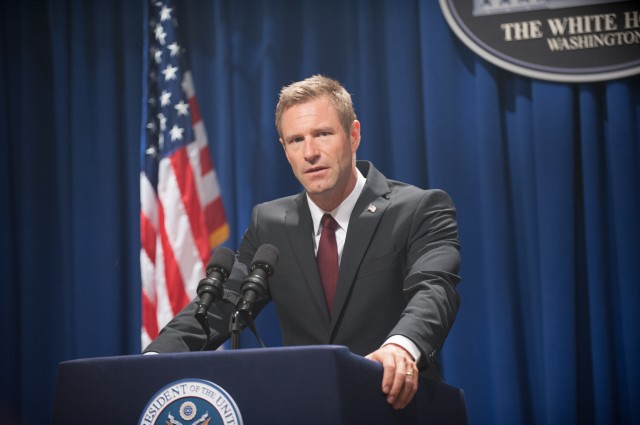The charming nature of the president of the United States, and his ability to protect those he serves from unforeseen threats, helps increase his relatability factor among not only American citizens, but the world overall. That’s certainly the case with the American president, Benjamin Asher (played by Aaron Eckhart), in the upcoming action thriller ‘Olympus Has Fallen.’ While Benjamin is personally struggling with the recent loss of his wife and having to raise their young son on his own, while also leading one of the most powerful countries in the world, he maintains his compassion from the world by working with the Secret Service during a terrorist hostage situation.
‘Olympus Has Fallen’ follows a group of terrorists who take down the White House (code name Olympus), leaving Mike Banning (Gerard Butler) to try to save the president of the United States. The small group of heavily armed, meticulously trained extremists launch a daring daylight ambush on Washington, overrunning the White House and taking the president and his staff hostage inside an impenetrable underground bunker. As a battle rages on the White House lawn, Mike joins the battle, and finds his way into the besieged building to do the job he has trained to do all his life: to protect the president at all costs.
Mike uses his extensive training and detailed knowledge of the presidential residence to become the eyes and ears of Acting president Allan Trumbull (Morgan Freeman) and his key advisers. With tensions rising, the radicals begin executing hostages and threaten to kill more unless their demands are met. America’s national security team must rely on Mike to locate the president’s young son, Connor (Finley Jacobsen), who is being sought as the ultimate test of the president’s loyalty to his country. Mike must also rescue the president before the terrorists can unleash their ultimate plan.
Eckhart generously sat down recently for a roundtable interview at New York City’s Waldorf Astoria Hotel to talk about the filming of ‘Olympus Has Fallen.’ Among other things, the actor discussed the difficulty of filming the physical aspect of the role of the president, such as being handcuffed in the bunker; how the boxing sequences help establish Benjamin’s youthfulness and his close relationship with Mike; and the critical relationship between the president and his young son, and how it showed Benjamin’s responsibility as a father and the Commander-in-chief.
Question (Q): Was there a physical discomfort to making this film, especially when you were handcuffed in the bunker? What was that like?
Aaron Eckhart (AE): Well, it was difficult. As an actor, you want to feel that you’re actually in the circumstances that they put you in. So I had to be up in those cuffs for eight hours a day, or more. I didn’t take them down too often; I didn’t like to take them off.
Pretty soon into the movie, I think I lost feeling in both of my arms. I would go home, and my arms would be numb. I actually had to question the doctor about it. But it’s good, it helps the character, and gets you into the mindset of being the president of the United States.
Q: That isn’t the kind of thing you think of when you sign onto a project, right?
AE: No. On the first day, when they put you up on the rail, and they say, put your arms up, you’re like, what? (laughs) Then you put the cuffs on. You think, we have three weeks in this room, in those cuffs. But that’s the name of the game.
But then your imagination starts to work, and you start to think of ways to use it to your advantage. You think, what can I do with my legs? I can head-butt him. How can I help the drama of the movie in these cuffs, in this stationary place?
There’s a lot you can do. So we started figuring those things out, which was quite exciting. You come up with ways to be vulnerable and strong at the same time. You come up with ways to be communicative in that instance. So it was quite nice.
Q: Like in the scenes where Melissa Leo’s being beat up, and you’re helpless.
AE: Yeah. With Melissa’s commitment to her craft, it was an inspiration being so close to her. When she was getting the crap beat out of her, it was tough. When she was being dragged, she had absolutely no self consciousness. She’s not conscious about whether she looks good or not, or whether or not she’s being dragged, and her skirt is up around her waist.
When you’re in that situation, and you’re not taking in that situation in the same way. You’re not looking at her as an actor doing this; you’re the president of the United States. When you’re in those circumstances, that’s what happens. She’s really an inspiration.
Q: What’s the thing you remember most about the first time you had to take a bullet as a character on screen?
AE: I’ll tell you about the first time I had to die. I don’t remember if I had to take a bullet, but it was very early in my career. I got chewing tobacco, and I swallowed it, which I highly do not recommend. I got sick as a dog, and there was no acting in that one. I must have been green, and I remember being sick afterwards.
The thing about being shot in this film was I got shot, and Antoine said cut. He came up to me and said, “Aaron, when you get shot, you get real dry in your mouth, and you start to hyperventilate, and your eyes roll up.” I said, “How do you know?” He pulled up his shirt and said, “I got shot twice right here.” So on the next take, I did it a little better. That’s invaluable information, knowing that the people around you can guide you.
But my mother doesn’t like it when I get shot. She has prohibited me from getting shot or dying in movies anymore.
Q: In the boxing scenes with Gerard, it helps establish his character. What was it like filming that, and what was your take on it?
AE: It was very important. It’s a very physical movie, obviously, and Gerry’s doing so much fighting, and is the perfect guy for the job. We wanted to establish that this was a youthful president, and that he had a young family and everything to look forward to in life. We wanted to show he had that breeziness, kind of like JFK, who could be effortless and commanding at the same time.
Antoine didn’t want a president who, once captured, would be a dead fish there. He wanted someone who would fight back, and that’s how we established that, with the boxing scene. Plus, it created a friendship with the two characters, and it shows the president has a great relationship with the Secret Service, and they trust each other. So that gave me permission to be physical when I was captured, like with the headbutt, or being defiant, or taking a punch. It allows the audience to be more comfortable with that.
Q: The relationship with Benjamin’s son is also good, because he isn’t used too much.
AE: Yeah, the son is critical. You’re reminded of not only the responsibility the president has for the country and the White House and the world in a lot of respects, but also his son. His wife just died in a horrific car accident, and she was ripped from his hands.
How do you go back to work and make good decisions, and listen to yourself and trust your instincts? How do you look your son in the eye? How do you make the right decisions for the country when you don’t know where your child is in the house? That’s tough, and I think you have to be stone cold in order to do that. There are a lot of interesting questions Antoine brought up in the film.
Q: Have you ever been to the White House and met any of our presidents?
AE: No, but I’ve been to the White House Correspondent’s Dinner. I went to a really interesting one, right before the 2008 election. I sat next to one of McCain’s guys, and it was a really interesting dinner. But that’s the closest I’ve ever gotten.
But I would like to go to the White House. I think it’s an honor to play the president. I have great honor for the office of the presidency.
Obviously, with the current 24-hour news cycle, we’re very familiar with the professional and personal lives of the president, and how much influence they have over our daily lives. So it was an honor to do that.
Q: Do you think we know too much about the president now?
AE: Well, it’s interesting that for politicians and athletes and actors, we know everything. But do we need to know everything Gerry and I do? (laughs) Need is the world in quotations, do we need to know that stuff? Is it interesting? Yes, of course, it’s always interesting to learn about other human beings, especially when they’re in extraordinary circumstances.
That’s always interesting, especially how they act, and you judge yourself against these people in that way. I think that makes their job a little harder. I think they have to be less themselves and more an act. Some people are better than others. It’s always refreshing to think of guys who can do it well, and make it seem effortless in these unbelievable circumstances. Like Obama plays basketball, and I think that’s good. But you definitely have to learn to play the game.
Written by: Karen Benardello

